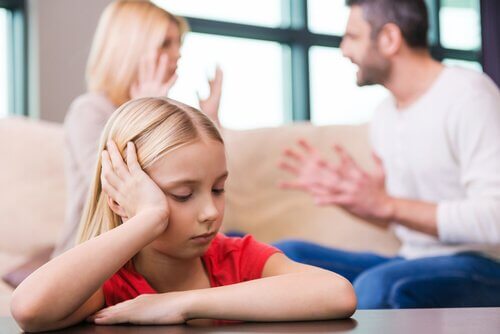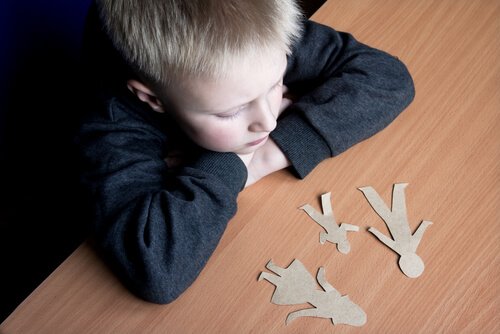How Do We Tell the Children We're Separating?

In life and in general, everything that has a beginning has an end. However, when it comes to relationships, we hope that our love never ends, much less if there are children involved. But if it does occur, we face a difficult question: how to tell the children we’re separating.
There’s always a probability that any relationship, for whatever the circumstances, comes to an end. When you have a family, you have to decide, no matter how hard it is, what’s best for everyone.
But how do we tell the children we’re separating? How do we tell them that they’ll no longer live with both parents under one roof, without it drastically affecting their existence?
When you have children, you need to prepare them a few months beforehand. But first, you must have exhausted every option to save the relationship. Then yes, you can explain to the children that the definitive separation of the parents is the best thing for the nuclear family.
Without a doubt, this decision will affect children. It could even cause them to feel things that they might not know how to handle, such as guilt, frustration, and anger.
To lessen the impact of receiving the news, you should know how to make this moment a little more bearable and less painful for children.
How to tell the children we’re separating
The reasons why
It’s essential to have tactics when explaining to children the reasons why adults separate. Of course, it’s better to avoid going into the details. We must also tell them that it’s a joint decision, even if the reality is different.

Family meeting
When you’re sure that your relationship is over, the best thing you can do is tell your children together. That way, the children will realize that even when your relationship is over, the situation is still handled as a family.
It’s ill-advised to allow children to think that getting separated is something of little importance and that the pain caused by the break up of the nuclear family will go away quickly.
Parents should be honest about the separation, speak clearly and calmly about the process and emphasize that they’ll be there to support them, especially when things get difficult.
Finding the right words
It’s advisable to avoid phrases such as “we no longer love each other,” or “our love is finished.” These can cause a lot of emotional damage. Most children have only seen their parents being affectionate towards each other and were always told that they were the fruit of that love.
Therefore, the most important thing when you’re going to tell the children you’re separating is to make your children understand how important they are, show them that everything ends on good terms and give them lots of love.
It’s not just the adults who suffer from the failure of their relationship; their children also feel the loss of what they may consider the most valuable thing in their lives: their family.
Make them part of the conversation
Sitting down with your children to talk it over is of utmost importance. It allows parents to know how their children feel and what they think about the situation.
It’s important that the children express their concerns, and parents must reassure them that they’ll be there to support them during the separation process.
“Parents should be honest about it, speak clearly and calmly about the process and emphasize that they’ll be there to support them, especially when it becomes difficult”
Commit to being good parents
It’s essential that the children know how to contact their parents; make sure they know that their relationship with you doesn’t have to change.
Although it may seem complicated, this is the time for you to strengthen the trust between you and your children. The most prudent thing is never to make promises you cannot keep since this hurts children’s feelings. They’re not the cause of what’s happening between mom and dad.
Don’t blame
You should never blame your partner for ending the relationship and, therefore, dividing the family. At first, there’s a lot of resentment, pain, and desire to point fingers and blame each other for the relationship failing. But this will only cause the children to have a hard time.

However, even though it’s very difficult, it’s best not to accuse your ex-partner of being responsible for the breaking up of the nuclear family. It’s unnecessary to tell the children who caused the separation. If you do so, you increase their chances of becoming rebellious and disobedient due to resentment.
When we have to tell the children we’re separating, we must face the situation cautiously and with a cool head, despite the pain felt on both sides. This will always help make the process more bearable.
Demonstrating emotional maturity will help children foster solid foundations in their future relationships. It will also keep them from creating traumas that could disturb their psychological development.
Lastly, we mustn’t forget that the children aren’t the ones getting divorced; it’s the parents who no longer wish to live together. Leave the children out of any situation related to the separation.
Children shouldn’t lose contact with their parents, or with their families because of arbitrary decisions made without any justification. Relationships end, but a family’s love is infinite.
In life and in general, everything that has a beginning has an end. However, when it comes to relationships, we hope that our love never ends, much less if there are children involved. But if it does occur, we face a difficult question: how to tell the children we’re separating.
There’s always a probability that any relationship, for whatever the circumstances, comes to an end. When you have a family, you have to decide, no matter how hard it is, what’s best for everyone.
But how do we tell the children we’re separating? How do we tell them that they’ll no longer live with both parents under one roof, without it drastically affecting their existence?
When you have children, you need to prepare them a few months beforehand. But first, you must have exhausted every option to save the relationship. Then yes, you can explain to the children that the definitive separation of the parents is the best thing for the nuclear family.
Without a doubt, this decision will affect children. It could even cause them to feel things that they might not know how to handle, such as guilt, frustration, and anger.
To lessen the impact of receiving the news, you should know how to make this moment a little more bearable and less painful for children.
How to tell the children we’re separating
The reasons why
It’s essential to have tactics when explaining to children the reasons why adults separate. Of course, it’s better to avoid going into the details. We must also tell them that it’s a joint decision, even if the reality is different.

Family meeting
When you’re sure that your relationship is over, the best thing you can do is tell your children together. That way, the children will realize that even when your relationship is over, the situation is still handled as a family.
It’s ill-advised to allow children to think that getting separated is something of little importance and that the pain caused by the break up of the nuclear family will go away quickly.
Parents should be honest about the separation, speak clearly and calmly about the process and emphasize that they’ll be there to support them, especially when things get difficult.
Finding the right words
It’s advisable to avoid phrases such as “we no longer love each other,” or “our love is finished.” These can cause a lot of emotional damage. Most children have only seen their parents being affectionate towards each other and were always told that they were the fruit of that love.
Therefore, the most important thing when you’re going to tell the children you’re separating is to make your children understand how important they are, show them that everything ends on good terms and give them lots of love.
It’s not just the adults who suffer from the failure of their relationship; their children also feel the loss of what they may consider the most valuable thing in their lives: their family.
Make them part of the conversation
Sitting down with your children to talk it over is of utmost importance. It allows parents to know how their children feel and what they think about the situation.
It’s important that the children express their concerns, and parents must reassure them that they’ll be there to support them during the separation process.
“Parents should be honest about it, speak clearly and calmly about the process and emphasize that they’ll be there to support them, especially when it becomes difficult”
Commit to being good parents
It’s essential that the children know how to contact their parents; make sure they know that their relationship with you doesn’t have to change.
Although it may seem complicated, this is the time for you to strengthen the trust between you and your children. The most prudent thing is never to make promises you cannot keep since this hurts children’s feelings. They’re not the cause of what’s happening between mom and dad.
Don’t blame
You should never blame your partner for ending the relationship and, therefore, dividing the family. At first, there’s a lot of resentment, pain, and desire to point fingers and blame each other for the relationship failing. But this will only cause the children to have a hard time.

However, even though it’s very difficult, it’s best not to accuse your ex-partner of being responsible for the breaking up of the nuclear family. It’s unnecessary to tell the children who caused the separation. If you do so, you increase their chances of becoming rebellious and disobedient due to resentment.
When we have to tell the children we’re separating, we must face the situation cautiously and with a cool head, despite the pain felt on both sides. This will always help make the process more bearable.
Demonstrating emotional maturity will help children foster solid foundations in their future relationships. It will also keep them from creating traumas that could disturb their psychological development.
Lastly, we mustn’t forget that the children aren’t the ones getting divorced; it’s the parents who no longer wish to live together. Leave the children out of any situation related to the separation.
Children shouldn’t lose contact with their parents, or with their families because of arbitrary decisions made without any justification. Relationships end, but a family’s love is infinite.
All cited sources were thoroughly reviewed by our team to ensure their quality, reliability, currency, and validity. The bibliography of this article was considered reliable and of academic or scientific accuracy.
- Amato, P.; Keith, B. (1991). Parental divorce and the well-being of children: A meta-analysis. Psychological-Bulletin, 1991 Jul; 110 (1): 26-46
- Caplan, G. (1993). Prevención de los trastornos psicológicos en los hijos de padres divorciados. En: Caplan, G. Aspectos preventivos en salud mental. Barcelona: Paidós.
- Garin, P. B. (1992). Un análisis exploratorio de los posibles efectos del divorcio en los hijos. Psicothema, 4(2), 491-511.
- Salvador, G. P., & Del Barrio, V. (1995). El efecto del divorcio sobre la ansiedad de los hijos. Psicothema, 7(3), 489-497. https://www.redalyc.org/pdf/727/72707302.pdf
- Shaw, D. (1991) The Effects of divorce on children’s adjustment. Behavior Modification, 15(4), 456-485.
- Testor, C. P., Pujol, M. D., Vidal, C. V., & Alegret, I. A. (2009). El divorcio: una aproximación psicológica. Universidad Ramon Llull, 2, 39-46. https://www.researchgate.net/profile/Carles_Testor/publication/242775375_El_divorcio_una_aproximacion_psicologica/links/54e43ae50cf282dbed6ea7ba/El-divorcio-una-aproximacion-psicologica.pdf
This text is provided for informational purposes only and does not replace consultation with a professional. If in doubt, consult your specialist.








